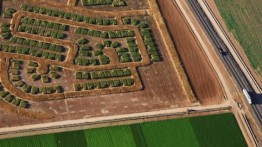Andrew Ross, Josh Fox and the Ruckus Society: A Weekend of Speakers and Workshops at CUISD
POSTED ON: November 21, 2011

MATTHEW MOORE ⅼ URBAN PLOUGH
Patrick Robbins
It was a busy but informative weekend for Cooper Union's Institute for Sustainable Design. On Friday, the Institute hosted Andrew Ross in the Rose Auditorium. Ross is a social theorist and cultural studies pioneer whose interests have increasingly focused on humanity's relationship to its landbase. In his most recent book Bird on Fire (available here), Ross explores the prospects and pitfalls of sustainability in Phoenix, Arizona. He came to speak about the research that led up to the book, which was conducted during a series of regular visits to the city over the last few years. Phoenix has been described as "The Least Sustainable City in America," and Ross argued that this makes Phoenix a particularly important barometer for the sustainability movement. Put simply, if Phoenix can become sustainable, any city can become sustainable.
Ross made a number of compelling points. Perhaps the most interesting aspect of his lecture was the extent to which he focused on what he called "social indicators" of sustainability. There is certainly no shortage of scientific indicators we can use to describe the sustainability of a given city - carbon emissions, groundwater depletion, etc. However, Ross argues that the instability of Phoenix is primarily a social issue, and as such, social indicators will ultimately determine the sustainability of the city. Ross described the social issues that led to its current state, such as the monocultural nature of its economy and the structural racism of its immigration policy. But he also outlined some exciting social forms, relationships based on mutual aid and struggles for equity, which offer hope for Phoenix as a whole.
On Sunday, the Institute was happy to host a more practice-oriented workshop concerning the recent struggle around hydrofracking in the Delaware River Basin. Notable speakers included Josh Fox (of GASLAND fame), David Braun from United For Action, and Joshua Kahn Russell from the Ruckus Society. The crowd was in high spirits - the workshop followed the last-minute cancellation of the Delaware River Basin Commission's Monday vote, which many took as an indicator that public support for hydrofracking in the Basin has crumbled. Russell spoke for most of the lecture, and led a fascinating and inclusive discussion on the practicality of different forms of political action.
Overall, the weekend showcased what the Institute for Sustainable Design is really about - engaged theory and informed practice, with the support of the best minds in the field.




